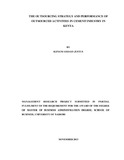| dc.contributor.author | Kenani, Justus A | |
| dc.date.accessioned | 2013-11-27T08:15:43Z | |
| dc.date.available | 2013-11-27T08:15:43Z | |
| dc.date.issued | 2013-11 | |
| dc.identifier.citation | Degree Of Master Of Business Administration | en |
| dc.identifier.uri | http://erepository.uonbi.ac.ke:8080/xmlui/handle/123456789/60687 | |
| dc.description | Management research project submitted in partial
Fulfillment of the requirement for the award of the degree
Of master of business administration degree, school of
Business, university of Nairobi | en |
| dc.description.abstract | The cement manufacturing industry is a very vital sector in the development of the
country. However the sector faces a number of challenges, principal among them include
power problems, climate protection and responsible use of all fuel and raw materials. It
therefore becomes important to develop strategies that will counter these challenges. It is
against this backdrop that the study sought to find out outsourcing strategies in these
cement manufacturing firms. Outsourcing is defined as the process by which a
corporation, a governmental agency or another business entity subcontracts to a third
party. Outsourcing strategy has become a common practice among both private and
public organizations and is a major element in business strategy. Perhaps most
organizations now outsource some of the functions they used to perform themselves. The
cement manufacturing industry is not an exception to this regard and it is key component
of the construction sector in Kenya and the region in general. The overall objective of the
study was to determine the outsourcing strategy and performance of outsourced activities
in the cement manufacturing firms in Kenya. This study was guided by various
theoretical and literature reviews. This was a cross-sectional census survey research. The
study had a total population of 6 cement manufacturing firms in Kenya. The study used
primary data which was collected using questionnaires. Descriptive and inferential
analysis (regression analysis) was used to analyze the quantitative data obtained. The key
findings of the study are the need to focus on core competencies and enhance efficiency
were the factors influencing outsourcing strategy adoption. The performance indicators in
outsourcing were improved technical capacity and enhanced performance contract. The
potential risks for outsourcing were found to be increased costs, low staff morale and
disclosure of commercial secrets. In light of the findings, the study recommends that
since most of the cement manufacturing firms have been successful in the adoption of
outsourcing strategy, there is need to focus the change management especially to
sensitize staff on outsourcing, also cost benefit analysis should be done so as to assess the
impact of outsourcing to the firms. Corporate/commercial secrets should be safeguarded
during the outsourcing process so as not to lose important information to outsiders. | en |
| dc.language.iso | en | en |
| dc.publisher | University of Nairobi | en |
| dc.title | The Outsourcing Strategy and Performance of Outsourced Activities in Cement Industry in Kenya | en |
| dc.type | Thesis | en |
| local.publisher | School of Business | en |

